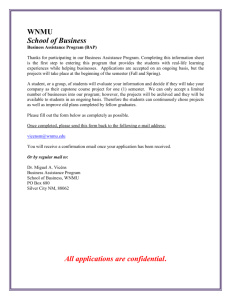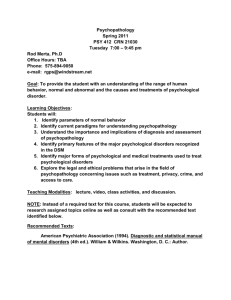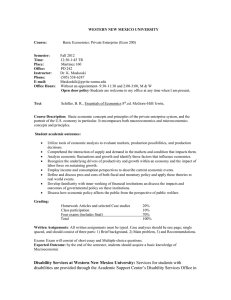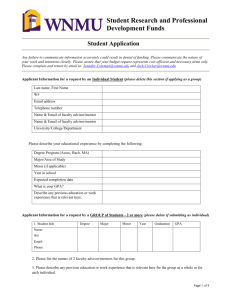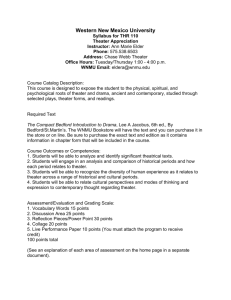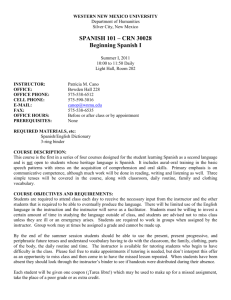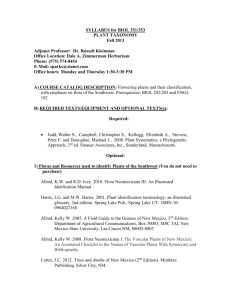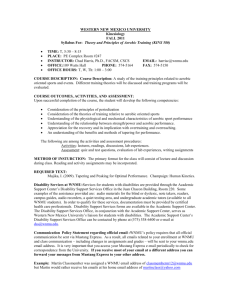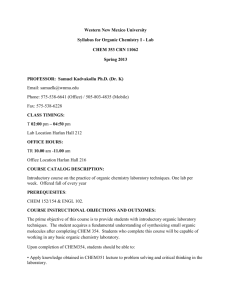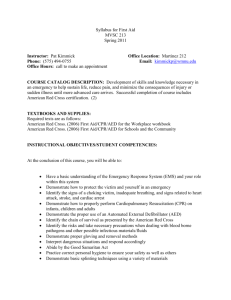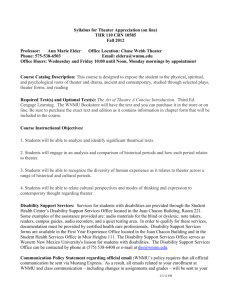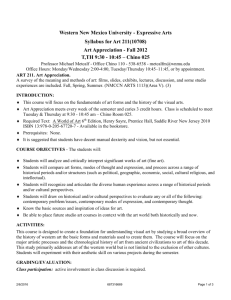MATH 312 CRN 10116 - Western New Mexico University
advertisement
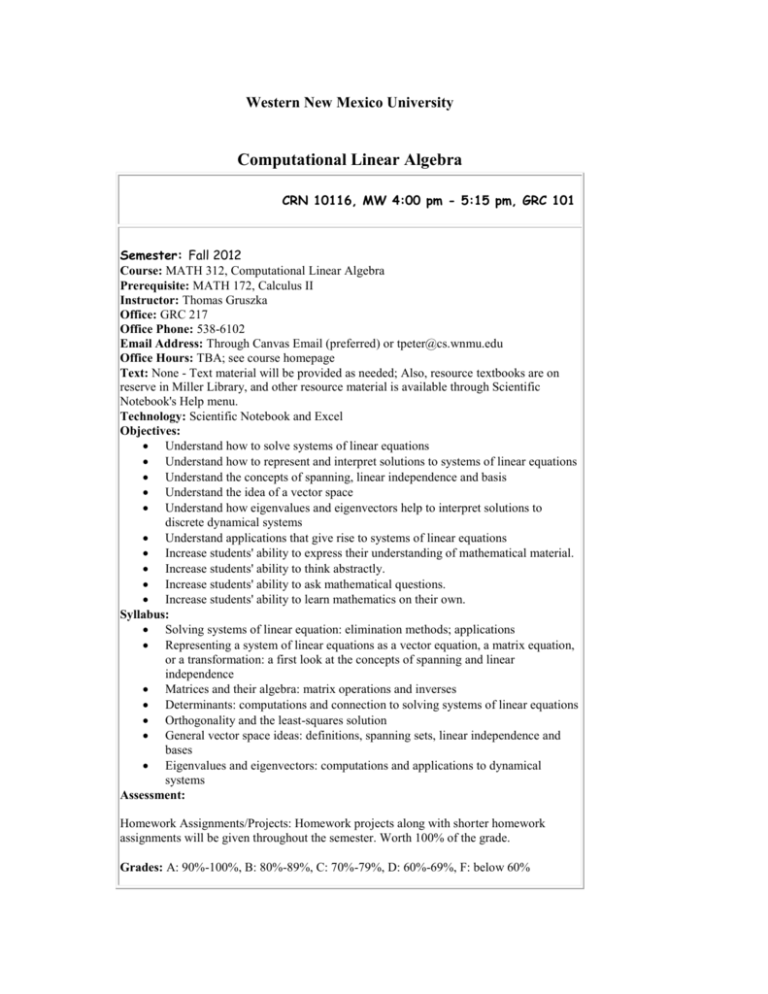
Western New Mexico University Computational Linear Algebra CRN 10116, MW 4:00 pm - 5:15 pm, GRC 101 Semester: Fall 2012 Course: MATH 312, Computational Linear Algebra Prerequisite: MATH 172, Calculus II Instructor: Thomas Gruszka Office: GRC 217 Office Phone: 538-6102 Email Address: Through Canvas Email (preferred) or tpeter@cs.wnmu.edu Office Hours: TBA; see course homepage Text: None - Text material will be provided as needed; Also, resource textbooks are on reserve in Miller Library, and other resource material is available through Scientific Notebook's Help menu. Technology: Scientific Notebook and Excel Objectives: Understand how to solve systems of linear equations Understand how to represent and interpret solutions to systems of linear equations Understand the concepts of spanning, linear independence and basis Understand the idea of a vector space Understand how eigenvalues and eigenvectors help to interpret solutions to discrete dynamical systems Understand applications that give rise to systems of linear equations Increase students' ability to express their understanding of mathematical material. Increase students' ability to think abstractly. Increase students' ability to ask mathematical questions. Increase students' ability to learn mathematics on their own. Syllabus: Solving systems of linear equation: elimination methods; applications Representing a system of linear equations as a vector equation, a matrix equation, or a transformation: a first look at the concepts of spanning and linear independence Matrices and their algebra: matrix operations and inverses Determinants: computations and connection to solving systems of linear equations Orthogonality and the least-squares solution General vector space ideas: definitions, spanning sets, linear independence and bases Eigenvalues and eigenvectors: computations and applications to dynamical systems Assessment: Homework Assignments/Projects: Homework projects along with shorter homework assignments will be given throughout the semester. Worth 100% of the grade. Grades: A: 90%-100%, B: 80%-89%, C: 70%-79%, D: 60%-69%, F: below 60% Disability Services at Western New Mexico University: Services for students with disabilities are provided through the Academic Support Center’s Disability Services Office in the Juan Chacon Building, Room 220. Some examples of the assistance provided are: audio materials for the blind or dyslexic, note takers, readers, campus guides, audio recorders, a quiet testing area, and undergraduate academic tutors. In order to qualify for these services, documentation must be provided by qualified professionals on an annual basis. Disability Services forms are available in the Academic Support Center. The Disability Services Office, in conjunction with the Academic Support Center, serves as Western New Mexico University's liaison for students with disabilities. Inclement Weather Policy: The Math/CS department will follow delays or cancellations due to inclement weather as announced by Silver Consolidated Schools. The announcements will be made via Albuquerque TV stations and local radio stations. Faculty have the responsibility for contacting students in the case of unannounced class cancellations. For this course the contact will be via Canvas. If a cancellation occurs during the final exam period, the final exam will be rescheduled. Academic Integrity Policy and Procedures: Each student shall observe standards of honesty and integrity in academic work as defined in the WNMU catalog. Violations of academic integrity include “any behavior that misrepresents or falsifies a student’s knowledge, skills or ability with the goal of unjustified or illegitimate evaluation or gain” (WNMU Faculty Handbook, 2008). Generally violations of the academic integrity include cheating and plagiarism. Refer to the catalog pages 60-61 for definitions. Plagiarism : “the intentional or unintentional representation of another’s work as one’s own without proper acknowledgement of the original author or creator of the work” (WNMU Faculty Handbook, 2008). Cheating: “using or attempting to use unauthorized materials…and unauthorized collaboration with others, copying the work of another or any action that presents the work of others to misrepresent the student’s knowledge” (WNMU Faculty Handbook, 2008). Penalties for infractions of academic integrity in this class are as follows: First offense will result in a zero for the assignment; second offense will result in a failing grade for the course. Communication Policy Statement regarding official email: WNMU’s policy requires that all official communication be sent via Mustang Express. As a result, all emails related to your enrollment at WNMU and class communication – including changes in assignments and grades – will be sent to your wnmu.edu email address. It is very important that you access your Mustang Express e-mail periodically to check for correspondence from the University. If you receive most of your email at a different address you can forward your messages from Mustang Express to your other address. Example: Martin Classmember was assigned a WNMU email address of classmemberm12@wnmu.edu but Martin would rather receive his emails at his home email address of martinclass@yahoo.com; Martin would follow the direction provided at http://www.wnmu.edu/campusdocs/direction%20for%20forwarding%20email.htm WNMU Policy on Email Passwords: WNMU requires that passwords for access to all of the protected software, programs, and applications will be robust, including complexity in the number of characters required, the combination of characters required, and the frequency in which passwords are required to be changed. Minimum complexity shall include: Passwords shall contain at least six (6) characters. Passwords shall contain at least one capital (upper case) letter, and at least one symbol (numbers and characters such as @ # $ % & *). Passwords shall be changed at least every 90 days. (8/6/08) Western New Mexico University 23 August 2012 tpeter@cs.wnmu.edu All Contents Copyright ©1998-2012
